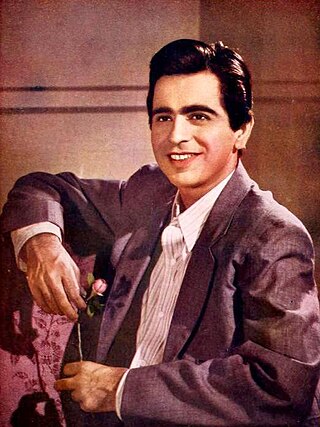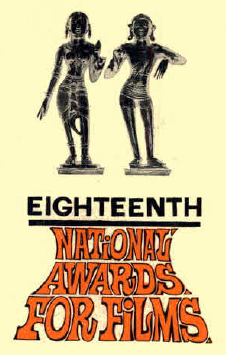
Dilip Kumar was an Indian actor who worked in Hindi cinema. Credited with pioneering method acting in cinema, he dominated the Indian movie scene from the late 1940s throughout the 1960s, being referred to as Abhinay Samrat by the audience. Kumar holds the record for most wins for the Filmfare Award for Best Actor and was also the inaugural recipient of the award. He is also referred to as The First Khan of Hindi Cinema. He holds the most dominant box-office record for a star in Hindi cinema with over 80% box-office successes and several long-standing gross records.

Shyam Benegal is an Indian film director, screenwriter and documentary filmmaker. Often regarded as the pioneer of parallel cinema, he is widely considered as one of the greatest filmmakers post 1970s. He has received several accolades, including eighteen National Film Awards, a Filmfare Award and a Nandi Award. In 2005, he was honoured with the Dadasaheb Phalke Award, India's highest award in the field of cinema. In 1976, he was honoured by the Government of India with the Padma Shri, the fourth-highest civilian honour of the country, and in 1991, he was awarded Padma Bhushan, the third-highest civilian honour for his contributions in the field of arts.

Maharaj Krishen Raina, popularly known as M. K. Raina, is an Indian theatre actor and director. Raina graduated from National School of Drama in 1970 with the Best Actor award.

Mysore Shrinivas Sathyu is a film director, stage designer and art director from India. He is best known for his directorial Garm Hava (1973), which was based on the partition of India. He was awarded Padma Shri in 1975.

Rituparno Ghosh was an Indian film director, actor, writer and lyricist. After pursuing a degree in economics, he started his career as a creative artist at an advertising agency. He received recognition for his second feature film Unishe April which won the National Film Award for Best Feature Film. Having won 19 National Awards, along with his contemporaries Aparna Sen and Goutam Ghose, Rituparno heralded contemporary Bengali cinema to greater heights. Ghosh died on 30 May 2013 in Kolkata after a heart attack. Ghosh was also one of the openly homosexual personalities in Indian cinema.

Goutam Ghose is an Indian film director, Actor, music director and cinematographer, who works primarily in Bengali cinema. He is the only Indian to have received the "Vittorio Di Sica" Award, Italy, in 1997.

Chetan Anand was a Bollywood film producer, screenwriter and director from India, whose first film, Neecha Nagar, was awarded the Grand Prix Prize at the first ever Cannes Film Festival in 1946. Later, he co-founded Navketan Films with his younger brother Dev Anand in 1949.

The National Film Award for Best Supporting Actor, officially known as the Rajat Kamal Award for the Best Supporting Actor, is an honour presented annually at India's National Film Awards ceremony by the Directorate of Film Festivals (DFF), an organisation set up by the Indian Ministry of Information and Broadcasting. A national panel appointed annually by the DFF selects the actor who has given the best performance in a supporting role within Indian cinema. The award is presented by the President of India at a ceremony held in New Delhi.

Haqeeqat is a 1964 Indian Hindi-language war-drama film directed and produced by Chetan Anand. The film stars Dharmendra, Balraj Sahni, Priya Rajvansh, Sudhir, Sanjay Khan and Vijay Anand in major roles. The music of the film is composed by Madan Mohan and the lyrics of the songs are by Kaifi Azmi. The film is based on the events of the 1962 Sino-Indian War about a small platoon of soldiers in Ladakh pitched against a much larger adversary. The film was constructed around the battle of Rezang La in Ladakh and showcases a fictionalised version of the last stand of Ahir Company, 13 Kumaon led by Major Shaitan Singh. However the film is not only a representation of war, but a dramatic retelling of the impact war has on the common soldier. Chetan Anand dedicated the film to Jawaharlal Nehru and the soldiers in Ladakh. The film is widely considered one of India's greatest black and white war-films.

Jagriti is a 1954 Indian Hindi-language film directed by Satyen Bose. It was based on the 1949 Bengali film Paribartan that Bose had also directed. The film stars Rajkumar Gupta, Abhi Bhattacharya, and Ratan Kumar in the lead roles. The film won the Filmfare Award for Best Film at the 3rd Filmfare Awards in 1956. Bhattacharya received the Filmfare Award for Best Supporting Actor for his outstanding performance in Jagriti at the same ceremony. Jagriti still considered one of the best children-centric films of India.
Sanjit Narwekar is an Indian documentary filmmaker scriptwriter and author. A 1967 alumni of Bombay Scottish High School, Mumbai, he completed his Bachelor's in Statistics (1974) and his Master's in Economics (1976) from the University of Mumbai.

Tapan Sinha was one of the most prominent Indian film directors of his time forming a legendary quartet with Satyajit Ray, Ritwik Ghatak and Mrinal Sen. He was primarily a Bengali filmmaker who worked both in Hindi cinema and Bengali cinema, directing films like Kabuliwala (1957), Louha-Kapat, Sagina Mahato (1970), Apanjan (1968), Kshudhita Pashan and children's film Safed Haathi (1978) and Aaj Ka Robinhood. Sinha started his career in 1946, as a sound engineer with New Theatres film production house in Kolkata, then in 1950 left for England where he worked at Pinewood Studios for next two years, before returning home to start his six decade long career in Indian cinema, making films in Bengali, Hindi and Oriya languages, straddling genres from social realism, family drama, labor rights, to children's fantasy films. He was one of the acclaimed filmmakers of Parallel Cinema movement of India.
Aadhi Haqeeqat, Aadha Fasana is a 1990 Hindi/English language Documentary Feature film directed by Dilip Ghosh and produced by Ravi Malik in association with the National Film Development Corporation of India.

Atanu Ghosh is an Indian filmmaker. His Bengali film Mayurakshi (2017) was awarded the National Film Award for Best Feature Film in Bengali. His film Angshumaner Chhobi, Mayurakshi, Binisutoy, Abby Sen and Rupkatha Noy, bagged multiple Awards.He was born on 12 August 1969 in Kolkata, West Bengal. One of his Bengali movies named Mayurakshi was awarded as the Best Feature Film in Bengali. Atanu started his career as a scriptwriter and director for documentary films in 1996. For his work in Aar Ek Bampi, he received the Doordarshan National Awards for Best Children's Telefilm.

Ranjan Ghosh is a Bengali filmmaker based out of Kolkata, India. He had risen to prominence with the release of Aparna Sen's Bengali feature film Iti Mrinalini, by becoming the first and the only screenwriter, the acclaimed actor-director had collaborated with in her illustrious career till date. With this film, Ghosh had made his screenwriting debut. He made his directorial debut in 2014 with the critically acclaimed Hrid Majharey, a Bengali feature film starring Abir Chatterjee and Raima Sen. Inspired by certain iconic plays of William Shakespeare, it was the first film in the Bengali language based on the works of the Bard and was presented as a tribute on his 450th Birth Anniversary. His second film Rongberonger Korhi was an anthology of four short films woven around the theme of money and its relationship with human beings. It featured National Award-winning actor Rituparna Sengupta, veteran cine star Chiranjeet Chakraborty, critically acclaimed actors Ritwick Chakraborty, Soham Chakraborty, Kharaj Mukherjee, Arunima Ghosh, Arjun Chakrabarty and others. It became a widely acclaimed film on release in 2018, before doing the festival rounds in Dubai, Dhaka, London, and nationally at Delhi, Mumbai, Bengaluru, Pune and Hyderabad. In 2019, Ghosh released his third feature film, the hugely successful Ahaa Re featuring Bangladeshi actor Arifin Shuvoo, Rituparna Sengupta, Amrita Chattopadhyay, Paran Bandopadhyay, Deepankar De, Shakuntala Barua, Bangladeshi Cinema film actor Alamgir in a special appearance as a restaurant owner. The film made it to a coveted list of 25 all-time great Asian films about food, compiled by international film web magazine Asian Movie Pulse. Ghosh's fourth feature film Mahishasur Marddini - A Night to Remember featuring his muse Rituparna Sengupta along with Saswata Chatterjee, Parambrata Chattopadhyay and a bunch of young theatre actors, released in 2022 and is touted as his boldest work till date in which he experiments with form and style, combining the elements of theatre and cinema. The film was screened at the Film and Television Institute of India, Jawaharlal Nehru University, Jamia Millia Islamia, University of Hyderabad, English and Foreign Languages University, University of Kerala, SNDT Women's University, Pondicherry University, IIT Bombay, Indian Institute of Science Education and Research, Kolkata and Tata Institute of Social Sciences. The Indian People's Theatre Association, Kollam District Committee, Kerala, screened the film in August 2023. Earlier, it became the first Indian feature film to screen at any theatre festival anywhere in India when it played at the 21st Habitat Theatre Festival, 2022, organized by the India Habitat Centre, New Delhi.
The 36th Filmfare Awards were held in 1991.

The 18th National Film Awards were held in Chennai, India in November 1971 by the Indian Ministry of Information and Broadcasting for Indian films released in 1970. The awards were presented by then President of India, V. V. Giri.
The 38th National Film Awards, presented by Directorate of Film Festivals, the organisation set up by Ministry of Information and Broadcasting, India to felicitate the best of Indian Cinema released in the year 1990. Ceremony took place in 1991.
Bauddhayan Mukherji aka 'Buddy' is a national award winning Indian filmmaker based in Mumbai. He is the co-founder—along with this wife Monalisa—of Little Lamb Films, which has produced three feature films, Teenkahon, The Violin Player and Manikbabur Megh and one documentary short, Kiske Liye ; His forthcoming films include Marichjhapi and The Bookkeeper's Wife.
Nabyendu Chatterjee was an Indian Bengali and Hindi film director and producer. A director of twelve feature films and three documentaries, Nabyendu has curved out a sure niche for him in the field of serious and useful cinema of India. His films such as Aaj Kaal Parsur Golpo, Sarisreep, Chopper,Sanskar, Atmaja, Sauda, Shilpi, Parasuramer Kuther,Ranur Pratham Bhaag and Mansur Mian-r Ghora offers glimpses into his directorial directorial talent engaged in exploring diverse social, political and humane issues. He has to his credit a bunch of National Awards. Shilpi, one of his films screened at the 25th International Film Festival of India(IFFI) at Calcutta won two international awards. One at the World Television Film Festival in Japan and the other at the 14th Festival International du film d' Amiens held in France.














